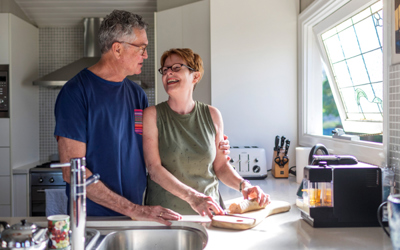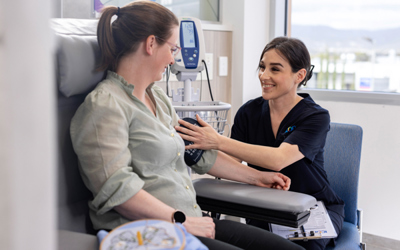Quick facts about brain cancer
The chance of surviving brain cancer for at least five years is 15%
Cancerous brain tumours represent 3% of cancer diagnoses in the UK.
Types of brain cancer
There are more than 130 different types of brain tumour, most of which are very rare. They are usually named after the type of cell from which they develop and/or the area of the brain in which they are growing.
Cancerous (malignant) tumours – These tend to be fast growing and can be either primary (originate within the brain) or secondary (having spread to the brain)
Non-cancerous (benign) tumours – These tend to be slower growing and don’t spread to other areas of the body. Some tumours which begin as non-cancerous growths can become cancerous, although this is rare.
Common types of primary brain cancers include glioma and non-glioma cancers:
-
Glioma cancers
These cancers begin in the gilial cells the cells that surround the nerve cells and are the most common type of brain cancer. They are named according to the type of glial cell they develop from and can include astrocytoma, ependymoma, glioblastoma, oligoastrocytoma and oligodendroglioma
-
Non-glioma cancers
These cancers begin in other parts of the brain including the cerebellum (medulloblastoma), the membranes (meningioma), the pituitary gland (pituitary cancer) and the Schwann cells that cover the nerves in the brain (schwannoma)
Signs and symptoms of brain cancer
As signs and symptoms for brain cancer can be similar to other common conditions, it’s important to see your GP or healthcare professional if you experience any of the symptoms below. Discussing anything concerning with your doctor as soon as possible can help give you peace of mind and offer the best chance of successful treatment if you receive a brain cancer diagnosis.
The signs and symptoms of brain cancer you experience can depend on where in the brain the tumour is located.
However, some common symptoms of brain cancer include:

Changes in your senses (including sight, smell, hearing and taste)

Difficulty with balance

Loss of memory and difficulty with speech

Headache, nausea and vomiting

Changes in personality such as irritability, anxiety or depression

Mild or severe seizures
Grading primary brain cancer
Tumours of the brain and spinal cord are usually given a grading number between 1 and 4 (I-IV) which describes its characteristics and how the cancer compares to normal cells. Because brain and spinal cord cancers typically don’t spread to other areas of the body, a grading system is used that is different to the staging systems used with more common cancers.
The grading system takes into account molecular features and involves checking the cells under a microscope (known as histology).
-
Grade I
These tumours are non-cancerous, grow slowly and don’t tend to spread.
-
Grade II
These tumours are non-cancerous and don’t tend to spread, however they are likely to return after treatment.
-
Grade III
These tumours can grow quickly and include cancerous cells, but no dead cells.
-
Grade IV
These tumours grow quickly and have a mixture of cancerous cells and dead cells.
Treatment for brain cancer
There are many different types of treatment for brain cancer. Your treatment will depend on you and your cancer.




